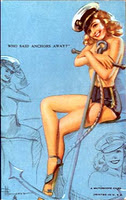A Big,Fat Piece of Cold, Hard Truth
I have a confession to make.
One day my husband asked how far along I was in completing a painful and awfully close to home story that's haunted me for a while. While the story is ultimately hopeful, its progression begins in tragedy. The story centers around two parents, who love each other and love their severely autistic child, but come drawn into bitter battle over the how far medical science should go to intervene when this disabled child falls into a semi-conscious state. Michael Schiavo had just re-emerged on the news radar, providing another reminder that Willo' the Wisp's (book's title) time was now. I'd already been kicking myself for avoiding returning to the manuscript. So beyond having the plot, synopsis and two agonizing to write chapters sitting on my hard drive, I'd wasted an awful lot of time doing everything imaginable to avoid diving into that story.
"How far have I gotten? How far?," I ranted. "You're gone all the time. I have three kids here, two of them autistic, and one of them in puberty. The school dumps crisis after crisis on me and you want to know my f***ing word count? And did I mention that the last time I actually had a chance to write, you used it up to go to Home Depot? Try doing your job under those conditions."
Then that man my mother told me not to marry said the most vile thing any would be writer ever heard. "If you aren't writing its only because you don't want to."
Thud.
What my husband said to me represented a very low blow. It was pretty hard to swallow the fact that someone who is supposed to love me would serve me up a big, fat piece of cold, hard truth. Admitting to myself that the pompous one had made a dead-on observation regarding my stalling tactics just plain hurt. Blaming life for my paucity of writing time allowed me to turn my back on the real truth for years. You see, not writing at all is far easier than to risk falling butt first into failure.
A new book fell into my hands not so long ago. It was a thin paperback, very simply bound. Someone actually thought my nonverbal son might enjoy it. And he did, immensely. We both cried as we read that book together.
The writing was spare in the way of haiku. I'd have enjoyed the work even had I not read the back cover copy. You see, the fact that this author's thoughts ever made it onto paper in the first place is nothing short of miraculous.
The Diving Bell and the Butterfly was written by a paralyzed, nearly vegetative author from what would soon become his death bed. After a catclysmic neurological event left him paralyzed everywhere but his left eye, he dictated this luminous contribution to literature to an assistant without speaking, signing, or even pointing to a single word. He communicated his artistic vision by blinking a code with his left eye designed to tell an assistant what letter it was that he wanted committed to paper.
Read it.
If you still doubt that your life will never allow you to orchestrate a way to lay words onto paper, then I promise you that you never will.
No more excuses.
Go write.



